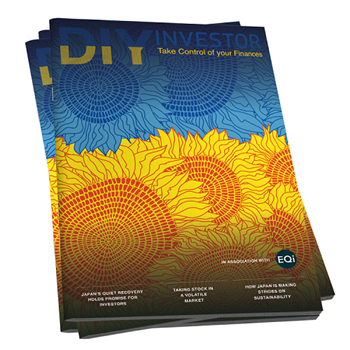Sustainable growth through volatile markets
Volatile markets can be uncomfortable for investors and portfolio managers alike. As investors for decades in the emerging markets, the portfolio managers of the JPMorgan Emerging Markets Investment Trust plc (JMG) have found that anchoring around a sound strategy is key to navigating choppy markets.

An investment strategy anchored on sustainable growth is key to
navigating choppy markets – Austin Forey, Portfolio Manager
For JMG, that anchor is its focus on sustainable growth over the long term. Regardless of the market environment, the portfolio managers are constantly looking for great businesses – those with strong competitive positions, sustainable business models and robust governance practices.
Sometimes, these sustainable growth characteristics support near-term performance as well as long-term results; other times, cyclical macroeconomic factors may dominate near term returns. Recently we’ve seen a mix of impacts across the portfolio.
TOP OF MIND: RUSSIA AND ENERGY PRICES
State-owned enterprises (SOEs) present an interesting example. This structure is relatively common across the emerging markets, often in sectors such as energy and banking.
In many cases, these companies serve a variety of interests, other than those of minority shareholders, and may not run as efficiently or profitably as companies in the private sector.
As a result, the Trust tends to have limited exposure to SOEs because the business model often is not aligned with minority investors and governance issues can arise when the state is overly involved in the management.
The high number of SOEs in Russia, combined with some additional governance concerns about the involvement of the state in the private sector, has contributed to historically fewer Russian companies in the Trust.
The portfolio’s limited exposure to Russia before the Ukraine conflict has contributed positively to performance in recent months.
Our view on the governance and profitability of SOEs also contributes to our underweight position in the energy sector in the emerging markets, but there is more to it.
Our focus on long-term sustainable growth tends to result in limited exposure to volatile commodity-related companies, where corporate earnings and share prices are often highly influenced by the commodity prices. Furthermore, many energy companies also face risks from the transition to a low-carbon environment.
As a result, the Trust has long-standing underweights in cyclical sectors, such as energy and materials.
In the near-term, however, with energy prices spiking to recent highs, shares of energy companies have also risen sharply, which has been headwind to the portfolio’s performance.
LONG-TERM POSITIONING: FINANCIALS, CONSUMER PRODUCTS AND INFORMATION TECHNOLOGY
Our focus on strong, sustainable business models has resulted in structural overweights across three broad categories: financials, the consumer and information technology (IT), each accounting for about 25% of the portfolio.
Across the financials sector we see many fast-growing, nimble private sector companies competing against SOEs in the sector, which have low levels of credit and insurance penetration. And while our positioning is based on companies with strong long-term prospects, the Trust is benefitting from a macro tailwind – rising interest rates are positive for most financial services businesses.
We have found many consumer businesses to be excited about across the emerging markets. Our positions tend to be in iconic, local brands across consumer staples, food producers and pharmacy retailers, as well as e-commerce companies with long runway for growth.
Our positioning across the IT sector ranges from semiconductor manufacturers and data centres to asset-light IT service providers that provide software development for big multinational companies.
The remaining 25% of the portfolio spans the health care, media and communications sectors, where innovation and asset-light business models are creating new companies serving a rapidly growing consumer base across the emerging markets.
SUSTAINABLE GROWTH INCORPORATES ESG CONSIDERATIONS
Environmental, social and governance (ESG) has always been a clear input into the Trust’s focus on finding companies with sustainable growth. ESG factors are considered in the initial phase of research through the team’s checklist of 40 questions related to ESG issues and a materiality framework.
Equally important to the process is the team’s presence in the markets they cover – close to 40 sector analysts are based across eight locations. At times, this local presence has provided unique insight needed to make an investment decision.
One example is our investment in the largest condiment producer in China.
The company had a relatively low rating from an external provider, based on the view that the company lacked a sufficient strategy and guidelines for its sourcing of soybeans.
However, our Mandarin-speaking analysts based across Asia had a different view, having spoken at length with the company and learned that the products are extensively tested for quality and do not use genetically modified organisms (GMOs).
These insightful conversations gave the portfolio management team the confidence to invest in the company based on the team’s proprietary views.
Volatility is inherent in stock markets, especially in the rapidly growing and changing emerging markets.
While we cannot control volatility, we can manage a portfolio through it by focusing on high-quality companies capable of producing sustainable long-term returns.
Find out more about JP Morgan Emerging Markets investment trust >
This is a marketing communication and as such the views contained herein do not form part of an offer, nor are they to be taken as advice or a recommendation, to buy or sell any investment or interest thereto. Reliance upon information in this material is at the sole discretion of the reader. Any research in this document has been obtained and may have been acted upon by J.P. Morgan Asset Management for its own purpose. The results of such research are being made available as additional information and do not necessarily reflect the views of J.P. Morgan Asset Management.
Any forecasts, figures, opinions, statements of financial market trends or investment techniques and strategies expressed are unless otherwise stated, J.P. Morgan Asset Management’s own at the date of this document. They are considered to be reliable at the time of writing, may not necessarily be all inclusive and are not guaranteed as to accuracy.
They may be subject to change without reference or notification to you. It should be noted that the value of investments and the income from them may fluctuate in accordance with market conditions and taxation agreements and investors may not get back the full amount invested. Changes in exchange rates may have an adverse effect on the value, price or income of the products or underlying overseas investments. Past performance and yield are not reliable indicators of current and future results.
There is no guarantee that any forecast made will come to pass. Furthermore, whilst it is the intention to achieve the investment objective of the investment products, there can be no assurance that those objectives will be met. J.P. Morgan Asset Management is the brand name for the asset management business of JPMorgan Chase & Co. and its affiliates worldwide.
To the extent permitted by applicable law, we may record telephone calls and monitor electronic communications to comply with our legal and regulatory obligations and internal policies. Personal data will be collected, stored and processed by J.P. Morgan Asset Management in accordance with our EMEA Privacy Policy www.jpmorgan.com/emea-privacy-policy. Investment is subject to documentation. The Annual Reports and Financial Statements, AIFMD art. 23 Investor Disclosure Document and PRIIPs Key Information Document can be obtained free of charge from JPMorgan Funds Limited or www.jpmam.co.uk/investmenttrust.
This communication is issued by JPMorgan Asset Management (UK) Limited, which is authorised and regulated in the UK by the Financial Conduct Authority. Registered in England No: 01161446. Registered address: 25 Bank Street, Canary Wharf, London E14 5JP.
Read the latest edition of DIY Investor Magazine
DIY Investor Magazine
The views and opinions expressed by the author, DIY Investor Magazine or associated third parties may not necessarily represent views expressed or reflected by EQi.
The content in DIY Investor Magazine is non-partisan and we receive no commissions or incentives from anything featured in the magazine.
The value of investments can fall as well as rise and any income from them is not guaranteed and you may get back less than you invested. Past performance is not a guide to future performance.
DIY Investor Magazine delivers education and information, it does not offer advice. Copyright© DIY Investor (2016) Ltd, Registered in England and Wales. No. 9978366 Registered office: Mill Barn, Mill Lane, Chiddingstone, Kent TN8 7AA.

